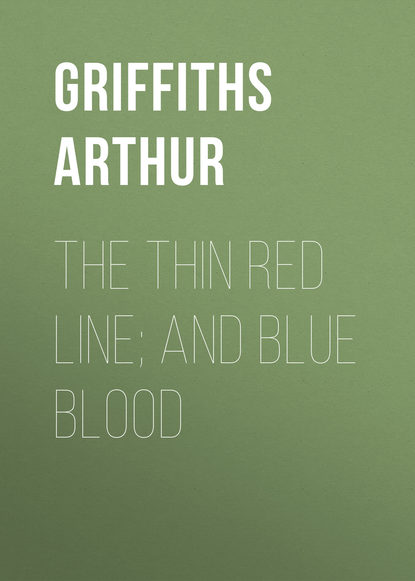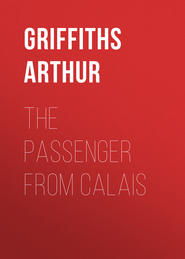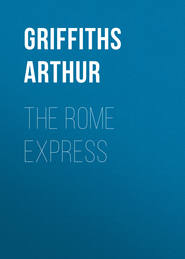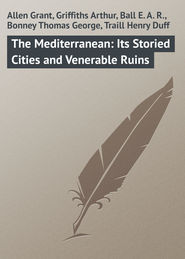По всем вопросам обращайтесь на: info@litportal.ru
(©) 2003-2024.
✖
The Thin Red Line; and Blue Blood
Настройки чтения
Размер шрифта
Высота строк
Поля
When he issued forth from his tent it was to receive the cordial congratulations of his brother officers. Sergeant Hyde came up, too, a little doubtfully, but McKay seized his hand, saying—
"You do not grudge me my good luck, I hope, old friend?"
"I, sir?"—the address was formal, but the tone was full of heartfelt emotion. "You have no heartier well-wisher than Colour-Sergeant Hyde. Our relative positions have changed—"
"Nothing can change them, or me, Hyde. You have always been my best and staunchest friend. It is to your advice and teachings that I owe all this."
"Go on as you have begun, my boy; the road is open before you. Who knows? That field-marshal's baton may have been in your pack after all!"
While they still talked a message was brought to McKay from General Wilders; the brigadier wished to see him at once.
"How is this, Mr. McKay?" said the general. "So you pretend to be a cousin of mine? Sir Colin Campbell has told me of his meeting with you, and now I find your name in full in the Gazette."
"It is no pretence, sir," replied Stanislas, with dignity.
"What! You call yourself a Wilders! By what right?"
"My mother is first cousin to the present Lord Essendine."
"Through whom?"
"Her father, Anastasius Wilders."
"I know—my father's brother. Then you belong to the elder branch. But I never heard that he married."
"He married Priscilla Coxon in 1805."
"Privately?"
"I believe not. But it was much against his father's wish, and his wife was never recognised by the family. His widow—you know my grandfather died early–married a second time, and thus increased the breach between the families."
"It's a strange story. I don't know what to think of it. These statements of yours—can they be substantiated?"
"Most certainly, sir, by the fullest proof. Besides, the present Lord Essendine is quite aware of my existence, and has acknowledged my relationship."
"Never openly: you must admit that."
"No, we were simple people; not grand enough, I suppose, for his lordship. At any rate, we were too proud to be patronised, and preferred to go our own way."
"I acknowledge you, Mr. McKay, without hesitation, and am proud to own so gallant a young man as my relative. You have indeed maintained the soldierly reputation of our family. Shake hands!"
"You are very kind, sir; I hope to continue to deserve your good opinion," and McKay rose to take his leave.
"Stay, Cousin McKay, I have more to say to you. What is this Sir Colin tells me about your speaking Russian?"
Stanislas explained.
"It may prove extremely useful; we have not too many interpreters in the army. I shall write to headquarters and report your qualifications. Do you speak any other languages?"
"French, Spanish, and a little Turkish."
"By Jove! you ought to be on the staff; they want such men as you. Can you sit on a horse?"
"I have ridden bare-backed many a dozen miles across the moors at home."
"Faith! I will take you myself. I want an extra aide-de-camp, and my cousin shall have the preference. I will send to Colonel Blythe at once; be ready to join me. But how about your kit? You will want horses, uniform, and—Forgive me, my young cousin: but how are you off for cash? You must let me be your banker."
McKay shook his head, gratefully.
"Thank you, sir; but I have been supplied from home. One of my uncles—my mother's half-brother—is well-to-do, and he sent me a remittance on hearing of my promotion."
"Well, well, as you please; but mind you come to me if you want anything. I shall expect you to take up your duties to-morrow." They were interrupted by all the bugles in the brigade sounding the assembly. "What is it? The alarm?"
"I can hear file-firing, sir, from the front."
"An attack, evidently. Hurry back to your camp; the regiment will be turned out by the time you get there!"
As McKay left the general's tent he met Captain Powys.
"The outposts have been driven in on Shell Hill and the enemy is advancing in force," said the aide-decamp. "We shall have another battle, I expect. It is our turn to-day."
This was Colonel Fedeoroff's forlorn hope against our extreme right: the sequel to Balaclava, the prelude of Inkerman—a sharp fight while it lasted, but promptly repulsed by our men.
CHAPTER XIV.
THE GOLDEN HORN
Since the English and French armies had established themselves in the Crimea and the magnitude of their undertaking grew more and more apparent, they had found their true base of operations at Constantinople. Here were collected vast masses of supplies and stores, waiting to be forwarded to the front; here the reinforcements—horse, foot, and guns—paused ere they joined their respective armies; here hospitals, extensive, but still ill-organised and incomplete, received the sick and wounded sent back from the Crimea; here also lingered, crowding the tortuous streets of Mussulman Stamboul and filling to overflowing the French-like suburb of Pera, a strange medley of people, a motley crew of various faiths and many nationalities, polyglot in tongue and curiously different in attire, drawn together by such various motives as duty, mere curiosity, self-interest, and greed. Jews, infidels, and Turks were met at every corner: the first engaged in every occupation that could help them to make money, from touting at the bazaars to undertaking large contracts and selling bottled beer; the second, representatives going or coming from the forces now devoted to upholding the Crescent; the third, mostly apathetic, self-indulgent, corpulent old Mussulmans riding in state, accompanied by their pipe-bearers, or sitting half-asleep in coffee-houses or at the doors of their shops. Now and again a bevy of Turkish ladies glided by: mere peripatetic bundles of white linen, closely-veiled and yellow-slippered; or a Greek in his white petticoat, fierce in aspect and armed to the teeth; or an Armenian merchant, Arnauts, Bashi-Bazouks, French Spahis, the Bedouins of the desert, but half-disguised as civilised troops, while occasionally there appeared, amidst the heterogeneous throng, the plain suit of grey dittoes worn by the travelling Englishman, or the more or less simple female costumes that hailed from London or Paris.
Misseri's hotel did a roaring trade. It was crowded from roof-tree to cellar. Rooms cost a fabulous price. Mrs. Wilders managed to be very comfortably lodged there notwithstanding.
She still lingered in Constantinople. Her anxiety for her husband forbade her to leave the East, although she told her friends it was misery for her to be separated from her infant boy. She might have had a passage home in a dozen different steamers returning empty, all of them in search of fresh freights of men or material; or there was Lord Lydstone's yacht still lying in the Golden Horn and ready to take her anywhere if only she said the word. But that, of course, was out of the question, as she had laughingly told her husband's cousin more than once when he had placed the Arcadia at her disposal.
They met sometimes, but never on board the yacht, for that would have outraged Mrs. Wilders's nice sense of propriety. It was generally at Scutari, where poor young Anastasius Wilders lay hovering between life and death, for Mrs. Wilders, with cousinly kindliness, came frequently to the wounded lad's bedside.
She was bound for the other side of the Bosphorus as she went downstairs one fine morning towards the end of October, dressed, as usual, to perfection.
A man met her as she crossed the threshold, a man dressed like, and with the air of, an Englishman—a pale-faced, sandy-haired man, with white eyebrows, rather prominent cheek-bones, and a retreating chin.
"Good morning, my dear madam." He spoke with just the faintest accent, betraying that English was not his native tongue. "Like a good Sister, going to the hospital again?"
Mrs. Wilders bowed, and, with heightened colour, sought to pass hastily on.
"What! not one word for so old a friend?" He spoke now in French—perfect Parisian French.
"I wish you would not address me in public: you know you promised me that," replied Mrs. Wilders, in a tone of much vexation, tinged with the respect that is born of fear.
"Forgive me, madam, if I have presumed. But I thought you would wish to hear the news."








